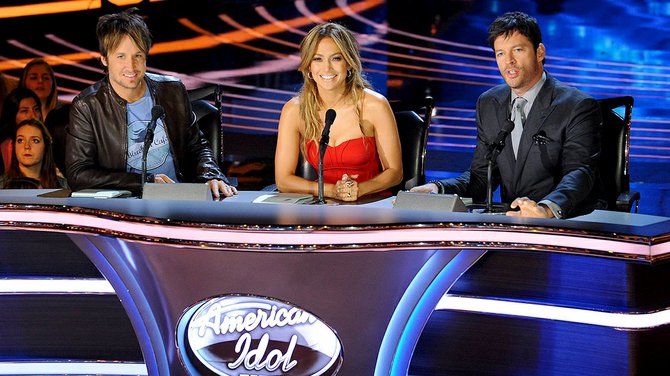Music television often aims at mass-producing marketable singers to increase the odds of success, rather than shaping enduring artistic icons.
Long before MTV pledged itself to around-the-clock music videos, then subsequently stopped showing music videos, people at home were already tuning into televised music. Late-night talk shows would spend precious airtime touting the latest musicians and bands so audiences could glimpse some of the greatest songwriters of their time.
As is the case with live broadcasts of concerts and rare musical collaborations, a close-knit connection between these two types of entertainment can be great news for listeners, giving them experiences they might not have the ability to see otherwise. But sometimes, it seems television has warped some of what we love about the audible art form.
When British entertainment mogul Simon Fuller pitched "American Idol" to Fox in 2002, it was likely an easy sell. The European version of the program, "Pop Idol," had proven wildly successful in its first season, and other countries had shown interest in hosting their own TV talent contests. For example, did anyone catch the most recent episode of "Indonesian Idol"?
Needless to say, with the many various industry attempts to fast track the next singing sensation, "American Idol" isn't wholly to blame. In a way, there isn't even blame at all. The reasons that I feel these get-famous-quick programs are harmful to the music community are essentially due to two things: a misappropriation of the term "idol" and a misunderstanding of what makes a musician truly iconic.
In regards to the first point, it's actually fairly easy to see and to note the obvious dilemmas that it can present. With every season of shows like "American Idol" or its more popular trans-channel rival "The Voice," a new winner is crowned and dubbed not only the best contestant, but also one of the best talents ever on the show. If you don't believe me about that last part, you must be fast-forwarding through episodes. Almost incessantly, the judges and coaches on these shows claim that one or occasionally multiple artists are "the best this show has ever seen." This serves a few different purposes; namely, it boosts the confidence of the performer, and moreover, it cements a person as exceptional in the audience members' minds.
Now, as to why these kinds of statements are detrimental to music, you may already have a guess. A glance at the show's track record reveals much. The only arguably true success stories in "American Idol" history are Kelly Clarkson, who won first season; Fantasia Barrino, who won third season; Carrie Underwood, who won fourth season; and Chris Daughtry, who only managed to place fourth in season five. Even in these cases, it's hard to imagine that future generations will look back on these singers with the same fondness that we view Elvis or Donna Summer or Elton John. And with shows continually pumping out pop stars, it's more and more likely that these winners will become faces in a crowd rather than the person a crowd comes to see. Basically, if everyone is an "idol," then no one is.
The second point can't be made without retreading some of the Golden Age artists I mentioned before and their peers. Singers and musicians such as Frank Sinatra, Michael Jackson, Simon & Garfunkel, and Hall & Oates exceeded their respective roles as songwriters and performers, in many cases representing whole periods of time for some people. For some people, their songs make up childhoods and first loves and every happy or sad moment in a life, and that's a good portion of what makes them so iconic. Not all great performers are songwriters, either, and some couldn't even play an instrument to save their lives. But there's just as much artistry in delivery as in creating the song.
Some good news still exists. That level of heart still has a place on TV. I've seen young men and women singing hits like they were written just for them, and it's every bit as entrancing as it should be. Obviously, fewer people on shows are capable of delivering songs from the depths that they deserve. Often, show producers attempt to elevate the spectacle for viewers rather than develop the skills onscreen. What we wind up with is ultimately a karaoke contest with a higher production value. But if music TV shows could refocus and cultivate entertainers who can be genuinely iconic, the world couldn't help but tune in.



Comments
Use the comment form below to begin a discussion about this content.